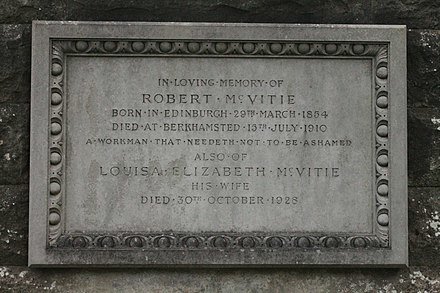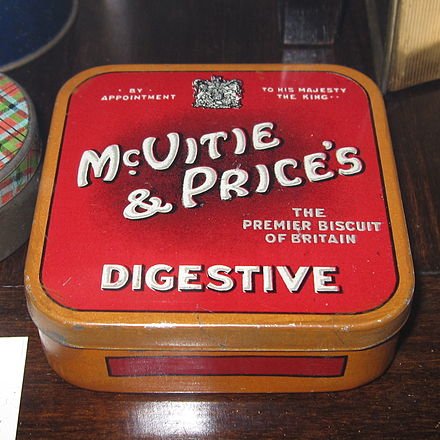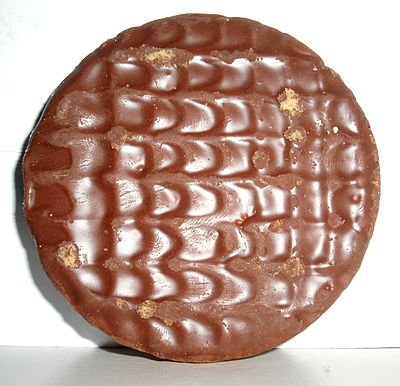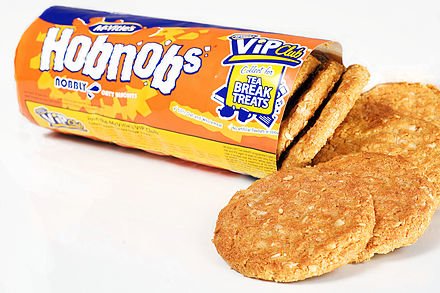British Heritage
Remember, Cherish, Learn.
beta
McVitie's - Britain's Favourite Biscuit
A Pillar of British Heritage Through Biscuit Making.
Rooted in tradition and famed for its classic confections, the McVitie's company is a cherished component of Britain's gastronomic heritage. With a history dating back to the early 19th century, McVitie's represents not only Britain's enduring love for biscuits, but also the nation's capacity for innovation, resilience, and adaptation in the face of changing consumer tastes and market dynamics.
Established in 1830 by Robert McVitie and his father John, the McVitie's journey began modestly as a provision shop on Rose Street in Edinburgh, Scotland. Originally a baker's apprentice, Robert McVitie transformed his family business into a thriving bakery, soon described as a "baker and confectioner" rather than a mere provision shop. Under the name McVitie & Price, Ltd., the company expanded its operations, opening additional bakeries in Edinburgh, Glasgow, and later in Heaton Chapel, Stockport, and Park Royal, London.
Robert McVitie's death in 1884 marked a significant turning point for the company. His son, also named Robert, decided to concentrate solely on biscuits due to their longer shelf life. The younger McVitie was helped by Alexander Grant, a seasoned biscuit maker who had briefly ventured into setting up his own bakery. In 1888, McVitie & Price built the St. Andrews Biscuit Works factory on Robertson Avenue in the Gorgie district, a testament to the growing success and ambition of the company.
As the company navigated the twists and turns of the 19th century, it made a series of decisions that would shape its destiny and contribute to the fabric of British life. Its first significant product, the McVitie's Digestive, was created by Alexander Grant in 1892. Named for its high baking soda content thought to aid digestion, this biscuit quickly became a beloved staple in British homes.
Several other beloved products followed, most notably the Rich Tea biscuit, redesigned in a smaller size in 1891 to cater to London tastes, and the McVitie's Chocolate Homewheat Digestive, launched in 1925. Later additions to the biscuit family included the Hobnob in 1985, and a milk chocolate variant in 1987. In 1927, the company launched Jaffa Cakes, which would become the best selling cake in the UK in 2012.
McVitie's connection with royalty started in 1893 when the company was commissioned to create a grand wedding cake for the royal wedding of the Duke of York and Princess Mary. They continued to receive royal commissions, further cementing their status within the British society. To date, McVitie's holds a Royal Warrant from Queen Elizabeth II, recognising the company as an official supplier to the Royal Household.
One noteworthy commission was the chocolate biscuit cake for the wedding of Prince William and Catherine Middleton in 2011. The inclusion of a traditionally homely treat in a royal wedding illustrates the deep affection for McVitie's products within British society, and their transcendence of class and status.
McVitie's resilience is demonstrated by its ability to adapt and modernise in a dynamic business environment. It went through several structural changes, such as merging with Macfarlane, Lang & Co., Ltd in 1948 to form the United Biscuits Group. The brand also became owned by Turkish company Yildiz in 2014, and subsequently became part of the pladis conglomerate in 2016.
Through all these changes, McVitie's has remained true to its original promise of quality. As of 2020, sales of McVitie's biscuits in the UK were more than five times that of the next two competitors, showcasing the company's dominance and the British public's loyalty towards it.
From a small provision shop to becoming the nation's favourite biscuit maker, McVitie's journey is a testament to British entrepreneurship, innovation, and tradition. The company has not only crafted biscuits that have become staples in British households, but it has also become a cultural symbol. McVitie's biscuits are associated with warm, comforting memories of family gatherings, teatime chats, and grand celebrations, underpinning their deep-rooted place within the fabric of British life.
As a part of British heritage, McVitie's is more than just a biscuit manufacturer. Its legacy continues to shape the nation's culinary preferences, contributes to economic growth, and adds a delicious layer to British history. The story of McVitie's is, in many ways, the story of Britain itself - a tale of endurance, evolution, and a never-ending quest for quality.
History and Founding
Established in 1830 by Robert McVitie and his father John, the McVitie's journey began modestly as a provision shop on Rose Street in Edinburgh, Scotland. Originally a baker's apprentice, Robert McVitie transformed his family business into a thriving bakery, soon described as a "baker and confectioner" rather than a mere provision shop. Under the name McVitie & Price, Ltd., the company expanded its operations, opening additional bakeries in Edinburgh, Glasgow, and later in Heaton Chapel, Stockport, and Park Royal, London.
Robert McVitie's death in 1884 marked a significant turning point for the company. His son, also named Robert, decided to concentrate solely on biscuits due to their longer shelf life. The younger McVitie was helped by Alexander Grant, a seasoned biscuit maker who had briefly ventured into setting up his own bakery. In 1888, McVitie & Price built the St. Andrews Biscuit Works factory on Robertson Avenue in the Gorgie district, a testament to the growing success and ambition of the company.
Pioneers in Biscuit Making
As the company navigated the twists and turns of the 19th century, it made a series of decisions that would shape its destiny and contribute to the fabric of British life. Its first significant product, the McVitie's Digestive, was created by Alexander Grant in 1892. Named for its high baking soda content thought to aid digestion, this biscuit quickly became a beloved staple in British homes.
Several other beloved products followed, most notably the Rich Tea biscuit, redesigned in a smaller size in 1891 to cater to London tastes, and the McVitie's Chocolate Homewheat Digestive, launched in 1925. Later additions to the biscuit family included the Hobnob in 1985, and a milk chocolate variant in 1987. In 1927, the company launched Jaffa Cakes, which would become the best selling cake in the UK in 2012.
A Royal Affair
McVitie's connection with royalty started in 1893 when the company was commissioned to create a grand wedding cake for the royal wedding of the Duke of York and Princess Mary. They continued to receive royal commissions, further cementing their status within the British society. To date, McVitie's holds a Royal Warrant from Queen Elizabeth II, recognising the company as an official supplier to the Royal Household.
One noteworthy commission was the chocolate biscuit cake for the wedding of Prince William and Catherine Middleton in 2011. The inclusion of a traditionally homely treat in a royal wedding illustrates the deep affection for McVitie's products within British society, and their transcendence of class and status.
Evolving for the Future
McVitie's resilience is demonstrated by its ability to adapt and modernise in a dynamic business environment. It went through several structural changes, such as merging with Macfarlane, Lang & Co., Ltd in 1948 to form the United Biscuits Group. The brand also became owned by Turkish company Yildiz in 2014, and subsequently became part of the pladis conglomerate in 2016.
Through all these changes, McVitie's has remained true to its original promise of quality. As of 2020, sales of McVitie's biscuits in the UK were more than five times that of the next two competitors, showcasing the company's dominance and the British public's loyalty towards it.
Conclusion: McVitie's and British Heritage
From a small provision shop to becoming the nation's favourite biscuit maker, McVitie's journey is a testament to British entrepreneurship, innovation, and tradition. The company has not only crafted biscuits that have become staples in British households, but it has also become a cultural symbol. McVitie's biscuits are associated with warm, comforting memories of family gatherings, teatime chats, and grand celebrations, underpinning their deep-rooted place within the fabric of British life.
As a part of British heritage, McVitie's is more than just a biscuit manufacturer. Its legacy continues to shape the nation's culinary preferences, contributes to economic growth, and adds a delicious layer to British history. The story of McVitie's is, in many ways, the story of Britain itself - a tale of endurance, evolution, and a never-ending quest for quality.
- McVitie'sen.wikipedia.org












